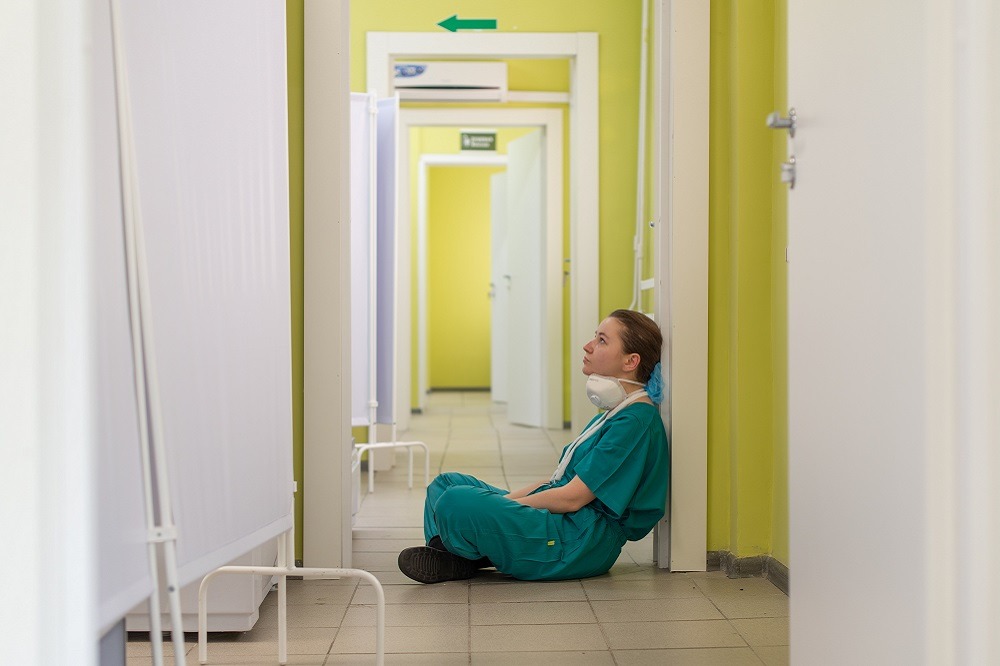Survey shows ‘significant levels of distress’ among nursing staff during Covid pandemic

Thousands of UK nursing and midwifery staff experienced “extremely concerning” levels of psychological distress according to a survey conducted in early stages of the pandemic.
Cardiff University collaborated with Barts Health NHS Trust, City University of London, University of Nottingham, University of Plymouth, and University of Surrey in a study led by the Royal College of Nursing Research Society and University of Warwick and King’s College London.
The research team revealed results from a survey measuring the ‘Impact of Covid-19 on the Nursing and Midwifery workforce’ (ICON) carried out during the first wave of the pandemic.
According to the RCN a total of 7,840 analysable responses were received from two surveys conducted during the initial surge between April and May 2020, and another during the recovery period, between July and August 2020.
Professor Daniel Kelly, from Cardiff University’s School of Healthcare Sciences, and RCN Chair of Nursing Research was part of the steering group conducting the survey.
He said: “These results point to stress and worry within the nursing workforce with almost one third of respondents reporting symptoms of depression.
“This is a situation that must be addressed by providing testing, safety equipment and support in all settings where nurses and midwives are working with great goodwill and bravery.”
Post traumatic stress
According to the findings a “significant” proportion of staff had probable post-traumatic stress disorder (PTSD), with over 29% of respondents continuing to report experiences indicative of probable PTSD in the final survey
17% of respondents in the third survey reported “severe or extremely severe” stress, down from a peak of 21% at the beginning of April 2020.
In the first survey, 25% of respondents reported “severe and extremely severe” anxiety falling to 18% in the final survey.
Occurrences of depression remained at a constant 20% across the three surveys.
Responding staff expressed concerns about feeling underprepared to work in Covid-19 environments, with 29% having been redeployed.
Of those, 63% that training to prepare for this “either did not occur or was inadequate” meaning they “lacked confidence” in infection prevention and control training.
In the final survey, more than a third of respondents said they had experienced a Covid-19 infection with the clinical workplace was the “most commonly identified source of infection”.
6% of those who had been infected with Covid-19 required hospital care with a third of them reporting they had not fully recovered.
Researchers concluded that organisations should “urgently implement evidence-based strategies” to support the wellbeing of members of the nursing and midwifery workforce.
Ruth Harris, professor of health care for older adults in the Florence Nightingale faculty of nursing, midwifery and palliative care at King’s College London, added: “Our findings should drive healthcare employers throughout the world to address shortcomings in their organisational response to Covid-19, and future health emergencies, to both prevent psychological issues developing and ensure that those affected receive timely, high-quality, evidence-based support during the pandemic and as needed thereafter.”
Support our Nation today
For the price of a cup of coffee a month you can help us create an independent, not-for-profit, national news service for the people of Wales, by the people of Wales.







Besides the poor pay increase from the Welsh Government to our sterling NHS Doctors, Nurses and Heath Workers during this pandemic, who I might add, have given their blood, sweat, tears and lives to protect us, has been compounded further by Boris Johnson’s calamitous hypocritical Conservative misrule in England along with their money orientated free-for-all travel rule that’s resulted in all variants of Covid entering through England thus permeating Wales destroying all the good work done with our Welsh vaccine rollout betraying the public goodwill and piling further stress & pressure on an already straining Welsh NHS & workforce.
Sad but true.
If this goes on, would it be sensible to have special small Covid Hospitals so that “normal” hospital work can carry on without the disruption? More expense perhaps, with different ambulances etc, but do the delays create even more expense due to deteriorating health among those awaiting treatment?
I agree. Additional capacity was built but removed when we thought the original Chinese variant Covid-19 was under control after the initial first vaccine rollout. So we thought
And seeing the other variants including Delta are still present and the more transmissible South African Omicron has become the dominant strain now in Wales, all measures must be taken as hundreds are suffering and dying due to the NHS inability to treat equally serious conditions like Cancer , Transplants and other ailments currently affected. or on hold.
The fake vaccine doesn’t stop people from getting Covid or any of its variants or giving others Covid or its variants. Been proven. Look at all the vaccinated people that are getting Covid. I see a disaster unfolding. That no one will be prosecuted for. Just saying